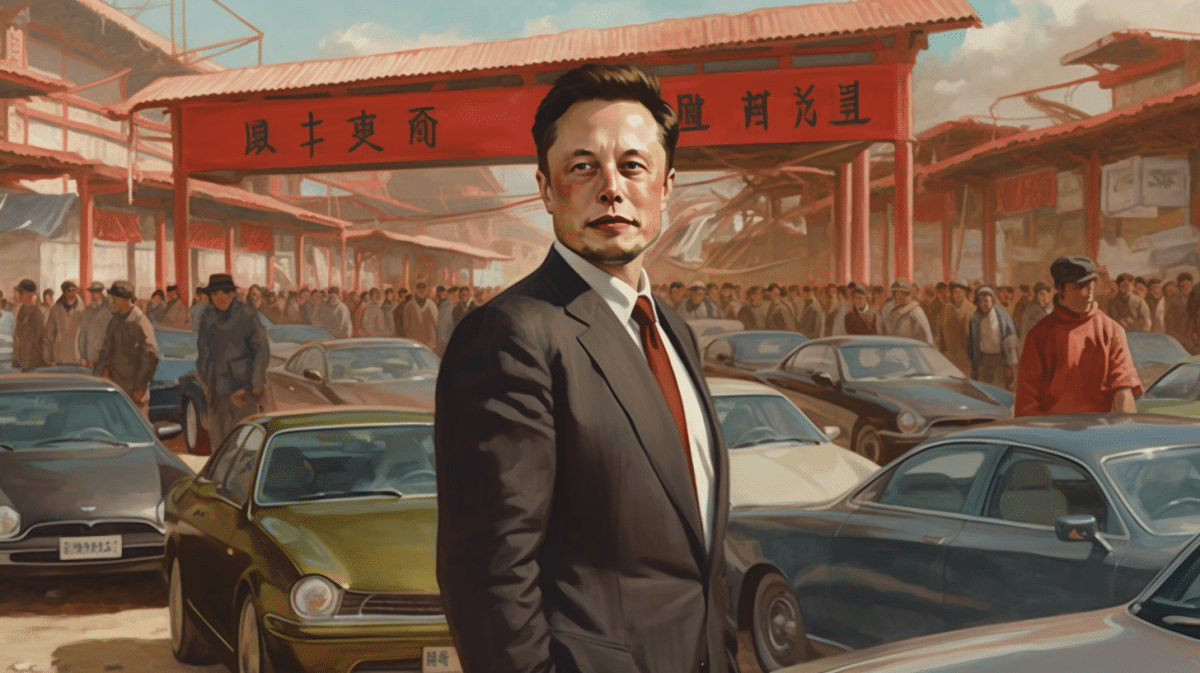Foreign executives have been flocking to the country since China lifted most of its pandemic-related travel restrictions in January. Elon Musk was also among them. He had good reasons for the trip: China is an important part of Tesla’s electric vehicle empire, both as a market and as a production location. The problem: As the owner of Starlink, SpaceX, and more recently Twitter, Musk has an even more complicated relationship with the giant empire.
Musk’s trip to China, which ended in early June, was barely mentioned in English-language media. This is mainly due to the fact that the Tesla boss was virtually silent on Twitter throughout the trip. While the short message service is officially blocked in China, people have all sorts of VPN tools to access it. Still, Musk didn’t seem to want to give the impression that he wanted to be on Twitter during his stay. He’s only tweeted about the trip once – and that’s only after after leaving China again had. He had even stopped commenting on other tweets during the period – something he usually does dozens of times a day.
However, from the public accounts on Chinese government websites and sightings of Musk on China’s social media, one can reconstruct his journey. It is clear that she was not unimportant. He had a fairly busy schedule: in 44 hours, Musk met at least three senior Chinese officials, had dinner with the CEO of the world‘s largest battery maker, and visited the Tesla factory in Shanghai, among other things.
Musk’s private jet landed in Beijing on the afternoon of May 30 (local time). On the same day, he met with Qin Gang, China’s new foreign minister and former ambassador to the US. According to the ministry’s press release, Musk said at the meeting that he strongly opposes supply chain decoupling between the US and China because the two countries are “like Siamese twins inextricably linked.” He then ate dinner with Zeng Yuqun, the CEO of CATL, a major supplier of batteries for Tesla vehicles.
Excursion to the gigafactory
The next day, Musk met with two other Chinese ministers responsible for trade and technology. Reuters reports that he also visited Vice Premier Ding Xuexiang, China’s sixth-highest party official, in the afternoon, but the meeting was not confirmed by either the government or Musk. In the evening he flew to Shanghai and visited the Tesla Gigafactory, where he took photos with employees, which he later published on Twitter.
On the morning of June 1, his last day in China, Musk squeezed in one last meeting with Shanghai party secretary Chen Jining before his 11:23 a.m. plane departed for Texas. And Musk wasn’t the first top American executive to visit China this year: He was preceded by Apple’s Tim Cook, General Motors’ Mary Barra, JP Morgan’s Jamie Dimon, Starbucks’ Laxman Narasimhan, and many more. But so far, Musk seems to have received the most support from everyone — both Chinese officials and people on Chinese social media.
The main reason seems to be that China and Tesla have had a mutually beneficial relationship for years. The People’s Republic is not only the second largest market for Tesla, but the Gigafactory in Shanghai produced more than half of the Tesla cars sold worldwide last year. On the other hand, the Shanghai factory also contributed significantly to local employment and tax revenue, making the city a center of electric vehicle production.
During the month-long shutdown of the Shanghai plant last year due to the coronavirus, the city government took extra precautions to ensure the plant could quickly resume production even as other aspects of city life were on hold. During his visit, Musk acknowledged these efforts and also thanked China’s Minister of Commerce.
Factors of disruption between Musk and China
So everything is sunshine? No. Because there are also things that complicate the relationship between Musk and China. For one, Starlink has long been a problem for Beijing because it enables users to circumvent the local Chinese internet, which lies behind the Great Firewall – the gigantic local censorship machine. The use of Starlink in Ukraine during the war, in which China appears to be largely siding with Russia, has highlighted the problem for party leaders. Earlier this year, it was reported that researchers at China’s military academies have already published dozens of papers on how to crack down on the Starlink satellites.
On May 30, Musk (or whoever runs their verified account there) posted a message on Weibo, the Chinese equivalent of Twitter, that should calm things down a bit: “The Chinese space program is far more advanced than most people realize “, it said appreciatively.
At the heart of Musk’s complicated relationship with China lies in the fact that his various companies have differing relationships with the Chinese government. Tesla is extremely welcome in the country; Twitter is a major headache for the government and is ultimately strictly banned; SpaceX and Starlink fall somewhere in between, presenting both a security risk and an opportunity for collaboration.
So far, Musk’s ownership of the other companies hasn’t caused Tesla to fall out of favor in China. But in this age of ongoing tensions between the US and China, dealing with the Chinese government is a very sensitive act for any American company — and Tesla makes a good indicator. No matter how much he trolls in the US, Musk needs to be more careful in China.

(bsc)
